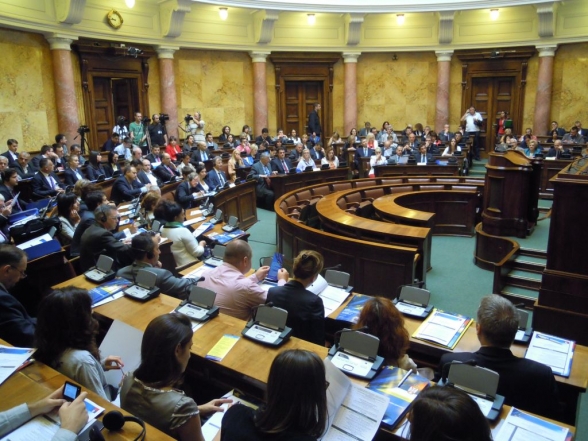At the two-day conference on the topic “Parliaments in a changing Europe: Citizens and representative institutions in modern governance”, which started yesterday in the National Assembly of Serbia, Secretary General Mr Damir Davidović had a statement on parliamentary control, within which he also presented the experiences of the Parliament of Montenegro in this field.
“A measure of success of the modern parliament is its capability to use the power provided to it by the Constitution, primarily regarding its oversight role. Control and oversight are, more or less directly, present in many aspects of work of the parliament, although they are not always visible, because they can be implemented on multiple levels and in various stages of parliamentary processes”, said Mr Davidović.
The Secretary General presented the instruments of the parliamentary control available to the MPs of the Parliament of Montenegro, including the Prime Minister’s Hour and parliamentary questions, control and consultative hearings, parliamentary inquiry, interpellation, and he also pointed out the amendments to the Rules of Procedure of the Parliament adopted the previous year, in order to further promote these instruments. Additionally, he emphasised the role of working bodies in implementation of the parliamentary control, especially through establishing new committees, Anti-Corruption Committee and Committee on European Integration, with oversight as their primary function. Mr Davidović said it was significant that the parliamentary oversight was most prominent in the sensitive areas essential for further democratic development of Montenegro, such as the budget and finance, security, European integration and human rights. In addition, the consideration and adoption of the annual reports submitted to the Parliament by certain state authorities in accordance with the law were increasingly being used as an effective mechanism of parliamentary control, encompassing consideration of established policies and adopted recommendations.
The statement within the session “Parliaments in a changing Europe” was also an opportunity to present new activities envisaged by Action Plan for strengthening legislative and oversight role of the Parliament of Montenegro in 2013, which, for most part, focus on parliamentary oversight over implementation of laws and conclusions adopted in the Parliament. Mr Davidović pointed out that regular monitoring of implementation of laws was aimed at ensuring their effective enforcement, thus avoiding subsequent control only when the problem in their implementation would emerge.
The Secretary General of the Parliament of Montenegro also referred to the role of the Parliamentary Service through providing support to the MPs in implementing parliamentary oversight. “In that sense, a lot has been done on strengthening administrative capacities of the Parliament, so that the MPs could make informed decisions, and also those within the oversight function. In addition to that, further promotion of work of the Service is a constant priority, so that it could respond to increasing amount of commitments”, said Mr Davidović.
The conference “Parliaments in a changing Europe: Citizens and representative institutions in modern governance”, was organised by the parliaments of Greece and Serbia, as partners within the Twinning Project “Strengthening Capacities of the National Assembly of the Republic of Serbia in the EU Integration Process”.
The participants of the conference were representatives of the parliaments, and other political and science institutions from Montenegro, Austria, Belgium, Bosnia and Herzegovina, France, Germany, Slovenia, Great Britain, as well as Serbia and Greece, countries which organised the conference. The key purpose of the conference was to establish how the parliamentary representation may be promoted by strengthening the relations with citizens and increasing of responsibility.








